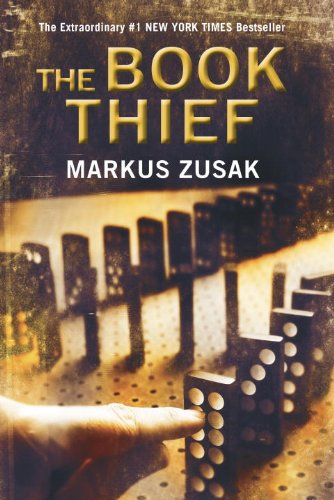© 2005, Pan McMillan, Australia (US
version © 2006, Knopf, NY)
 I first started noticing this one on bookstore shelves about
five or six years ago. The Book Thief.
What a great title for a book-lover like myself. I wanted to read it. Then I
heard that it was getting an award or two. That
made me want to read it more. Then they made it into a movie—now I have to read
it before viewing the movie. Well, now, I’ve read it and haven’t decided
whether to rent the movie or not (you can let me know what to decide in the
comments section). While I was waiting for the book to make it to me on library
request, we found a nice trade paperback copy at the local school Scholastic
Book Fair. As I bought it the librarian indicated that another parent had said
it was “one of the best books ever.” Now, I’m hooked.
I first started noticing this one on bookstore shelves about
five or six years ago. The Book Thief.
What a great title for a book-lover like myself. I wanted to read it. Then I
heard that it was getting an award or two. That
made me want to read it more. Then they made it into a movie—now I have to read
it before viewing the movie. Well, now, I’ve read it and haven’t decided
whether to rent the movie or not (you can let me know what to decide in the
comments section). While I was waiting for the book to make it to me on library
request, we found a nice trade paperback copy at the local school Scholastic
Book Fair. As I bought it the librarian indicated that another parent had said
it was “one of the best books ever.” Now, I’m hooked.
I must tell you, dear reader, it took me about three months
with stops and starts to get through the book. It isn’t a page-turner as such,
and it isn’t for the light of heart. American publishers chose to market it
under a YA labeling (Knopf Books for Young Readers was the first to release
it), and I’m not sure that I’d place it in the Juvenile section. There is some
really dark imagery in the book, the subject matter is really heavy, and from
time to time the language is not appropriate for younger readers. That said, I
would let my soon to be thirteen-year-old read it if she so chose with the
proviso that she and I make some discussion out of it.
It wasn’t until after I started reading the book that I
realized that it dealt with the Holocaust. That’s not necessarily a problem, I
just hadn’t done my usual fly-leaf, book back scanning, and so I had to put on
my Anne Frank/Hiding Place
glasses to get into the book. The story, narrated by none other than Death
himself, follows the life of Liesel Meminger—a young German girl who loses her
family and is thrust into the home of Hans and Rosa Hubermann as a foster
daughter. It is with a compelling eye and a heavy heart that you dive into the society
of Nazi Germany on the poor side of a Munich
suburb and feel all of the tragedy that befalls people who are just trying to
survive. And then the air raids start.
Readers are not spared the death, the politics, the cruelty,
or the heroism that could be witnessed in the streets of Germany during
a horrible time in world history. We see the maltreatment of the Jews—just for
being Jewish; the harsh punishment for people—just for being humane; and the
travesty for boys—just for being boys. From the story side, this book is good,
but not great.
From the literary side, this book is a masterpiece. I cannot
say that it is the best book I have ever read, but the weaving of the language
to build the right word pictures is nothing less than stellar. I would recommend
this one over Frank’s Diary to study the Holocaust if the purpose was to see
the event from a literary side (from a historical viewpoint, stick with Anne
Frank).
This book is not for everyone, but it deserves accolades and
it gets four out of five reading glasses from me.
—Benjamin Potter,
September 17, 2014









1 comment:
I liked it but didn't love it. I didn't know it was being marketed as a YA book, and I didn't think of it as one when I read it. The line between what's YA and what's "adult" is getting really blurry. I didn't see the movie. The book is usually my preferred experience.
Post a Comment